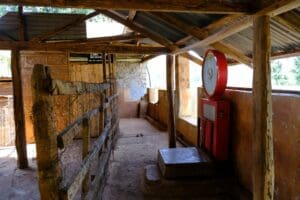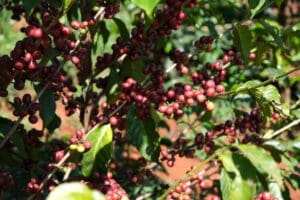The Kenya harvest is well underway, and we’re in the midst of our purchase planning process for 2023 shipments! To get a sense of how things are going on the ground, we reached out to our good friend Christophe Brinker with our primary Kenya exporting partner Ibero.
Atlas: Christophe, thanks for helping us share updates from Kenya with our roasters clients! First, could you tell us about pre-harvest conditions this year compared to previous years? Anything worth noting about the weather, cherry development, cost and availability of inputs, access to working capital, the prevalence of pests/fungus/other infirmities, etc.?
Ibero: The season started with an extended dry period beginning in 2021. Because of this, the trees were very stressed and managed to get a good flowering in April and May 2022, once the rains finally came. The weather then remained quite cold during the months of June to October, which was quite beneficial for cherry maturation. The second rainy season came in around the end of November but was quite short. Because of this, the amount of diseases remained quite manageable.
Atlas: How have harvest and processing conditions been so far? Is anything worth noting about the consistency of ripening, % of P1 parchment relative to other grades, drying conditions, etc.?
Ibero: We are seeing a bit more light coffees this year. Compared to the last main season, where we had up to 40% of AAs, the screen size is a bit smaller, but we still see good outturns of 25-35% AAs. However, the cherries show a high sugar content, and the quality seems quite promising.
Atlas: Are there any noteworthy updates regarding social or other developmental projects in areas that Atlas has been buying from?
Ibero: The Iyego cooperative has finally launched its Penagos eco-pulper at the Iyego main washing station. This is supposed to reduce water usage and reduce the efforts in processing coffees.
Atlas: Are there any updates regarding Bloom societies, statistics from their 2021/22 production, new initiatives funded by premiums, etc.?
Ibero: We have added some more cooperatives to the Bloom project and extended the Bloom agronomists team.
Atlas: Generally, have you noticed any quality trends from specific growing areas that Atlas and our clients should be mindful of? For example, are Murang’a, Kiambu, Kirinyaga, or Nyeri showing particularly interesting qualities or character from what you’ve cupped to date?
Ibero: This season, the cup profile in Central Kenya (including the aforementioned counties) shows more sweet/ dark fruits (berries) than citric and tomato acidity in previous years.
Atlas: How have conditions been at Endebess Estate so far this season? Do you have any early indications of how the quality and availability of naturals will be this year? How have the washed coffees from Endebess compared to coffees from other groups Atlas works with?
Ibero: The quality and quantity of the coffee at Endebess look very promising. They have received good rains during the year. For the natural, they have put in a lot of extra effort this year and have chosen cherries from specific well-performing blocks in the farm. We expect to see the first natural coffees (by early February) and are looking forward to cupping it. For the washed, we have only received the first pickings for now. The quality is good, but difficult to compare with central Kenyan coffees as the cup profile differs in Western Kenya. We expect the best-performing washed lots to be delivered towards the end of this month.
We hope this update is helpful and gets your purchase planning wheels turning! We’ll continue to post more news as it comes in, and please reach out to your Atlas rep for more info about planning and availability if you haven’t heard from them already. We begin cupping this week and are excited to share our upcoming coffees from Kenya!
All images used with credit/permission from Christophe Brinker.

